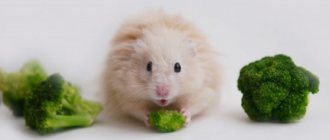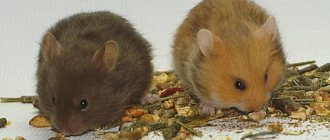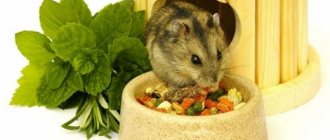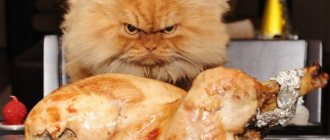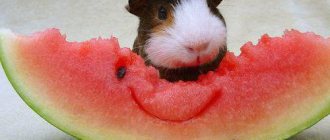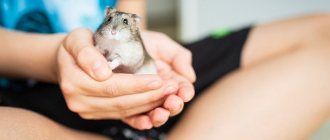Do hamsters need meat?
You can often hear the question from rodent owners about whether hamsters can be given meat. At the same time, opinions regarding the answer to this question are divided. Some owners believe that hamsters need meat, since it is a source of animal protein, but others are sure that the hamster is a vegetarian (read more about the best way to feed a hamster), and meat can make it aggressive. Who is right? In our today's publication we will try to find the answer to this question...
Can hamsters eat meat?
There is a widespread belief among the owners of this animal that if you feed it meat, cannibalism will eventually manifest itself. In general, homas are herbivores. Nevertheless, they will gobble up meat products with joy.
Hamsters can have meat, but it must be fresh, lean and always boiled.
What will be harmful:
- pork;
- beef;
- fatty lamb.
Excess fat in the body negatively affects the liver of rodents, causes excess weight, and is also difficult for the stomach. An excellent alternative to meat would be a hard-boiled egg, rich in nutrients and harmless to the animal’s delicate digestive system.
Prohibited meat products
Prohibited meat products include:
- Fatty meats (pork, lamb). These types of meat contain fat, mucus, histamines, substances that are not processed by the intestines and remain there to rot. All this becomes the cause of various types of infections and skin diseases (allergies, dermatitis). Eating pork is fraught with the development of arthritis and arthrosis in rodents.
- Sausages are a complex chemical product containing vegetable fats, stabilizers, nitrates, and flavor enhancers. This composition negatively affects the body of a small animal and shortens its life by half.
- Any raw meat. Leads to the development of helminthic infestations and various types of infections. It is poorly absorbed and causes diseases of the gastrointestinal tract.
- Grilled meat. It is considered a high-calorie food due to its high fat content. With its regular use, the concentration of fat in the pet’s body will reach such proportions that it will not be able to cope with it. This will lead not only to obesity, but also to heart, liver, and vascular disease. In addition, after frying, the meat loses all the vitamins and amino acids it contains.
- Dried meat. Not suitable for feeding a hamster due to its high salt content. Salt corrodes the walls of the stomach and negatively affects the liver and kidneys.
- Smoked meat. It is dangerous because the liquid smoke used in its preparation contributes to the development of gastritis and ulcers.
Can hamsters eat chicken?
Chicken fillet is even necessary in feeding a hamster, as it contains various microelements (phosphorus, iron, potassium), vitamins of various groups. The healthiest part of chicken is a good diet breast. Chicken meat will only benefit the animal.
Protein is necessary for growth, maintaining the tone of internal organs, affects the regeneration of blood cells and is aimed at the correct functioning of the body as a whole.
Chicken should be given in the morning, as protein is a quickly digestible element. Considering that hamsters are active at night, such light food is perfect for him during daytime sleep.
Hamster nutrition: do's and don'ts
It would seem that the answer to the question “What to feed a hamster?” very simple. However, in practice, feeding hamsters can raise many questions among inexperienced owners regarding whether this or that product can be given to their pet.
Hamsters must have a balanced diet
. This means that it will include not only ready-made dry food, which forms the basis of the diet, but also other products. In particular, you can give your hamster the following foods.
Cereals, nuts and seeds
. From cereals you can give wheat, oats, barley, buckwheat, rolled oats, lentils. They are given in dry form; Porridges cooked in water without salt or seasonings are fed to sick and weak animals. Nuts you can give are peanuts, hazelnuts, cashews, and walnuts. You can also give your hamster melon, pumpkin, sunflower and sesame seeds.
Vegetables, fruits and berries
. Hamsters' diet must include fresh fruits, berries and vegetables - a source of vitamins and moisture. Among the berries you can give currants, gooseberries, strawberries, pitted cherries, and blueberries. From fruits - apple, pear, apricot, melon, peach, banana, grapes, plum (in small quantities). Hamsters also enjoy eating dried fruits - dried apples and pears, raisins, dried apricots, banana chips.
Most vegetables are given to your hamster raw.
. You can treat your pet to pumpkin, carrots, bell peppers, tomatoes, cucumbers, radishes, radishes, zucchini, zucchini, beets, squash, turnips, green beans, fresh corn, Chinese cabbage, broccoli, fresh peas, young peas in pods. Occasionally and in small quantities, you can give cauliflower, peeled rose hips and celery. Some vegetables (pumpkin, carrots, beets and peas) can also be given boiled; they are cooked for a short time and without salt.
Greens, leaves and sprouts
. Hamsters' food may also include oat, wheat, bamboo and alfalfa sprouts. From greens you can give salad, dill, parsley, plantain leaves, dandelion leaves, nettles, clover. Hamsters also eat leaves of fruit trees (apple, cherry, pear), as well as other deciduous tree varieties (ash, beech, maple, willow, poplar, oak, birch, walnut).
All vegetables, fruits and berries that you give your hamster must be fresh, not overripe or spoiled
. Plants for a hamster should be collected away from roads and industrial enterprises. Any plant food should be washed thoroughly before giving it to your hamster.
Hamsters' diet also includes a protein component.
. This can be boiled chicken or low-fat boiled fish without seasoning and salt, low-fat fermented milk products (yogurt without additives and sugar, cottage cheese, kefir, all with a fat content of no more than 1%), boiled chicken or quail egg. Less often they give live food: butterflies, grasshoppers, mealworms, earthworms, dried gammarus. Any live food must be purchased at a pet store! Protein products are given to the hamster 2-3 times a week (of course, not all at once, but just one).
There are a number of foods that are not recommended to be included in a hamster's diet.
. They cannot be called strictly prohibited, but there is a high risk that they will cause irreparable damage to the health of your pet. These include cheese (especially fatty and salty varieties), acorns, Brazil nuts, persimmons, white bread, potatoes, as well as ready-made food for other rodents and birds.
Finally, there are foods that should absolutely not be given to hamsters.
. These include:
- salt, spices, sugar, both in pure form and as part of other products;
- fried, fatty, smoked food, any food from your table;
- exotic fruits (including pineapples, kiwi, avocado, pomegranate, citrus fruits), watermelon;
- fruit juices;
- leeks, garlic, mint, cabbage (white and red), sorrel;
- branches of coniferous trees, tulip, all plants and herbs collected within the city;
- cream, sour cream, milk, butter;
- muesli, breakfast cereals, kozinaki;
- almonds, apricot and cherry pits (contain hydrocyanic acid, which is lethal to hamsters);
- peel and eyes of raw potatoes;
- sausages, sausage, fatty meat;
- dry pasta;
- mushrooms;
- honey;
- black bread;
- bloodworms and wild-caught insects;
- chocolate, ice cream, cookies and any other sweets.
Proper nutrition for hamsters is one of the guarantees of their health. At the same time, it is very important to know which foods you can give your hamster and which you absolutely cannot.
Related publications:
Can hamsters have sausage and frankfurters?
Sausage is a rather specific product for rodents. Human food is usually harmful to pets, but if you still decide to treat your pet, then consider the following:
- Boiled sausage is the best option for a hamster in terms of treats; it is made from lean meats, but contains a complex of spices.
- It is highly not recommended to give raw smoked sausage, as they contain a large amount of fat, starch and a lot of food additives.
- Although sausages are made from lean meat, they also contain a large amount of spices and various additives, which is completely undesirable for hamsters.
The result is that any sausage and frankfurters are harmful to the body of Djungarian and Syrian hamsters.
About the composition of the product
There are several types of this product. On store shelves you can find boiled, smoked, liver, raw smoked and other types of sausages, as well as sausages, wieners, and bacon. The difference between types of sausages lies in the production method, composition, and appearance. Boiled sausage is made from lean meats with the addition of fat, a large amount of salt and food additives. Of all the above, a hamster can only eat meat and preferably chicken breast. Spices and salt negatively affect the baby’s body, destroying the liver, kidneys, and digestive organs. Sausages and sausages are made using the same technology, which means they cannot be included in the hamster’s diet either.
Uncooked smoked products are dangerous not only because of their ingredients, but also because of their manufacturing method. They are not boiled; the natural drying method only enhances the properties of flavoring additives, making the sausage spicier and saltier. The danger is that during smoking, carcinogenic substances can form in the product. A small piece of such a delicacy can be fatal.
Can hamsters fish?
Low-fat boiled fish can be given to little gluttons two to three times a week as a protein component of the diet. If you treated the homa with chicken meat, then you no longer need to give fish, since you need to feed it with one thing containing that amount of protein.
Seafood is rich in vitamins and iodine, and also contains virtually no heavy fats, so fish is a very healthy food. You can also add cod liver and fish oil to your hamster's diet (just one drop from a pipette). And although crab sticks can be classified as seafood, they are not suitable for fat people at all due to the high content of spices and other chemicals.
Benefits of seafood for your pet:
- strengthening the immune system;
- healthy silky fur;
- protection against colds;
- maintaining visual acuity.
What meat should not be included in a hamster's diet?
Another question that worries the owners of the animal is whether it is possible to give the hamster raw meat - after all, in the wild, rodents eat meat in its raw form.
However, you should not feed your pet:
- raw meat,
- sausages,
- sausages,
- fatty meat (lamb, pork).
Beef fiber is difficult for a hamster to digest. And pork can lead to more serious digestive upset.
It is strictly forbidden to give meat with spices, fried, dry-cured and any kind of smoked meat.
You should not add cutlets to the diet, as they undergo long-term heat treatment, which is not beneficial for the rodent.
Conclusion
To summarize, meat is a priority product in a hamster's diet. It is important to adhere to a few simple rules.
- Use boiled chicken more often, as this is the safest meat for the animal.
- Do not feed foods that are fatty, salty, peppery, or whose composition takes up more than five lines on the label.
- Boil lean meat and fish in a saucepan, cut into small pieces and put the cooled ones in a feeder.
- Treat your hamster to one type of protein food no more than 2-3 times a week.
When should you feed your pet meat?
As a rule, hamsters spend whole days sleeping and wake up around eight o'clock in the evening, so they need to develop an evening diet. You can feed them only once in the evening, and twice in the morning, then feed them with meat, which should only be fresh and good quality, like other food. The owner of the animal must monitor the pet’s sleep and wakefulness patterns and feed it on time and at the same time appropriate for it. The type of feed required is also the same. Early in the morning, for example, around seven o'clock, you can offer your pet hearty boiled vegetables, succulent food, herbs and protein foods.
The source of protein will be meat and fish, which should be boiled and without salt. A small piece of lard will do for a hamster. Healthy food for a hamster will be chicken meat, boiled liver and beef heart. Thanks to vitamin A contained in the liver, the pet's coat improves. The second feeding is in the evening and involves a grain mixture or porridge, and hamsters do not like to go without treats. Hamsters can eat small amounts of meat-based dog and cat food.
Meat products are also recommended for females who are about to give birth to offspring. They are very healthy, along with hard-boiled eggs.
Read more about hamster nutrition here.
Is something tasty healthy?
Hamsters are omnivores - this is a misconception. They, like many rodents, will eat everything edible that is offered to them. But many foods from our table are poison for pets. Their gastrointestinal tract cannot digest salty, sour, peppery, smoked, sweet, baked foods. Sausage, chocolate and even milk, cheese, and bread are the most harmful foods for rodents. They can eat bland and neutral food: oats, wheat, barley, corn, rapeseed. As well as vegetables and fruits in small quantities. But not all of them either: flatulence is caused by potatoes, watermelons, cabbage and all cruciferous plants.
